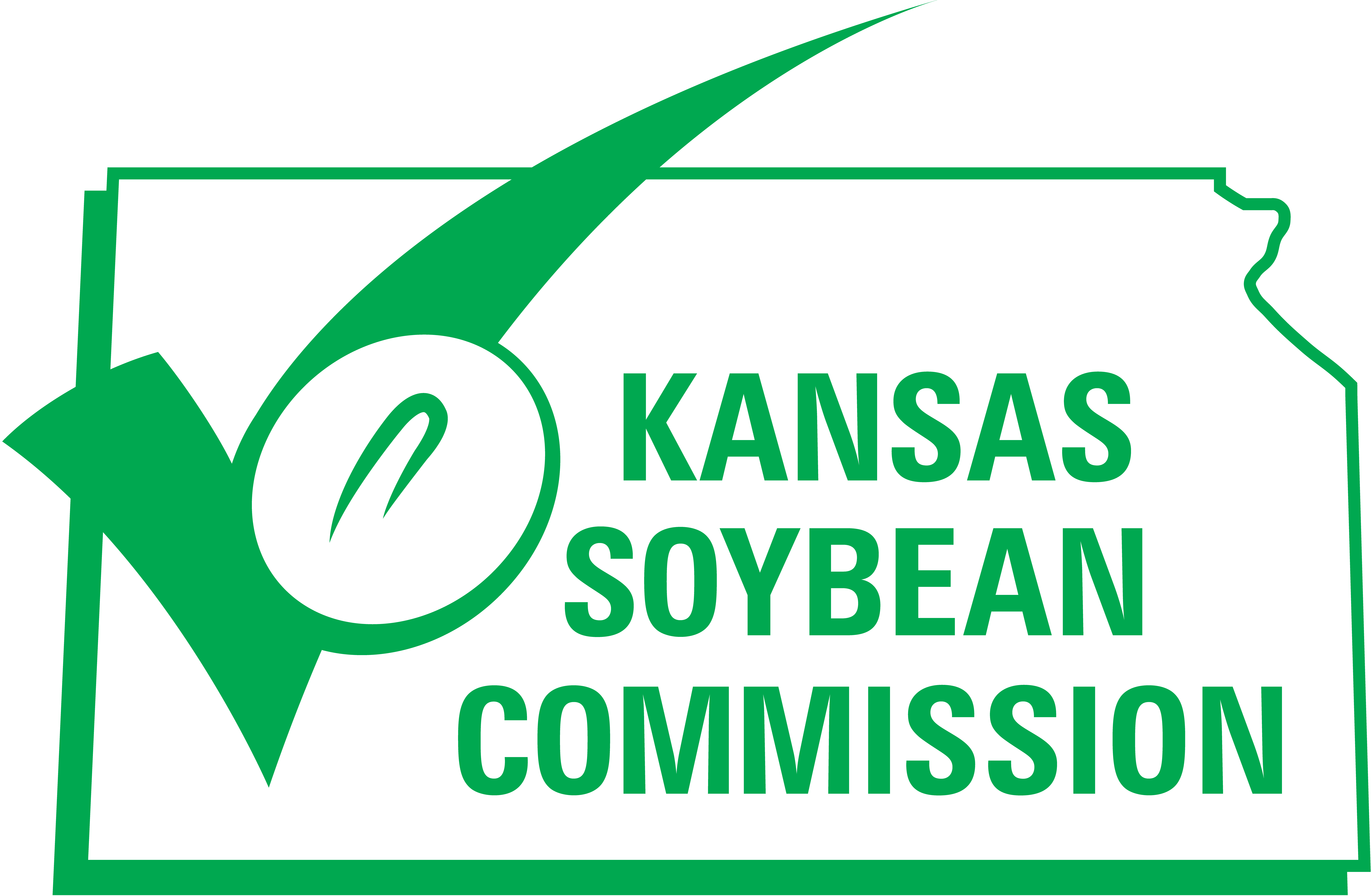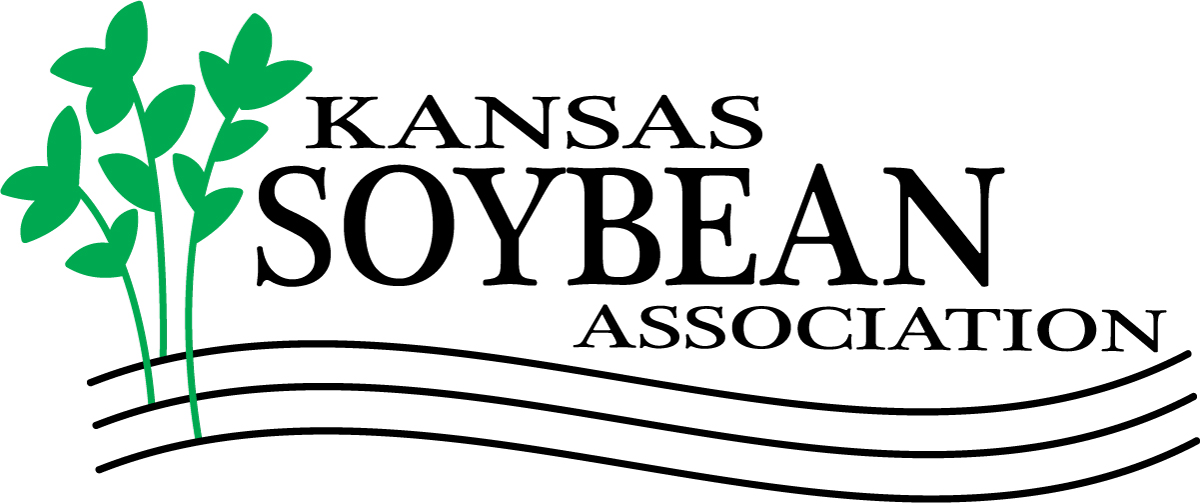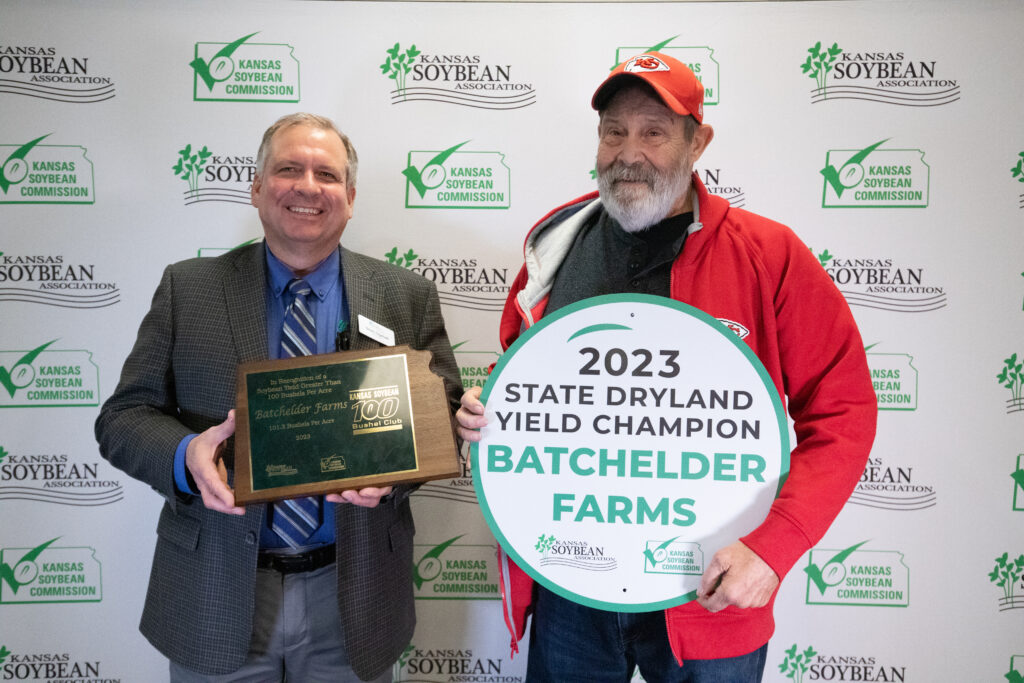Yield, value entries reach near record participation
Despite environmental challenges testing farmers throughout the 2023 crop season, the Kansas Soybean Yield Contest had a strong showing in entries with 40 participants – up 16 entries from the 2022 contest. The most recent iteration of the contest attracted several first-time entrants and brought back many familiar participants to make fierce competition for the top honors.
The highest-yielding entry of the 2023 contest came from Inman’s Brett Froese Farms. The entry plot yielded 104.2 bushels per acre and were entered in the statewide no-till irrigated division of the contest.
On behalf of Brett Froese Farms, Charles Johnson shared insight into the management of the highest-yielding entry.
“This particular field was no-till, and the soybeans were planted into standing corn stalks with an air seeder set on 10-inch rows,” he shares. “Typically, if we are looking for high-yielding soybeans under irrigation we would strip till. We did not on this one and still did okay.”
Strip tilling usually aids with emergence and seed placement into the soil, he explains.
The soybean variety was a break from normal operations, as well, as Johnson says they had not tried the Pioneer Seeds 42A84 Enlist soybeans before 2023.
“We do not have a lot of history on it. Our Pioneer rep recommended it as one of his best beans,” Johnson says. “We went with it, and it did well. It seems like this variety was a solid performer from the yield standpoint.”
With the soybeans under irrigation, the farm managers are cognizant of water efficiency and work with a crop service agency to provide water recommendations.
Bringing home the prize for having the highest dryland yield is Batchelder Farms of Highland with 101.3 bushel-per-acre soybeans. The Xitavo X03922E soybeans were entered in the north-northeast conventional-till division of the yield contest.
Batchelder says he is excited about the result of his first-ever entry in the yield contest. He attributes much of the success of his soybean crop to the implementation of no-till farming over the last 10 years. He also credits the field’s tenant and Mother Nature.
“My tenant, Brandon, is an advocate of soil testing,” he shares. “Plus, we had timely rains.”
Chad Neill of Effingham claimed top prize in the statewide value contest by entering soybeans with a premium of $1.27 over cash value, as calculated by AGP. Neill entered Pioneer 39A45X soybeans to earn first place.
“It’s surprising because I’ve planted this bean variety several years in a row and I’ve never entered it into the contest. I’ve always kind of kicked myself for not entering it, but I am happy I did this time for sure. It’s always been one of my favorite beans.”
As far as the most reliable management practices, “Fungicides and insecticides are a no-brainer. With the technology we have today, it is one thing you have to do. That seems to make a huge difference in the final quality.”
Neill says the 2023 soybean crop was expected to be one of his best – then it quit raining in August. It created a lot of inconsistencies – even in his local area – and the stress on the winning field of soybeans southwest of Effingham contributed to the quality because the soybeans encountered a lot of hot weather, he explains. Though most of his beans were treated the same, the overall crop showed fluctuations in yield and other characteristics.
As for encouraging peers to enter the value contest, “It is easy to do,” Neill says. “It is interesting to see what the results will be, and it is nice to know what you are raising.”
In the north-northeast conventional-till dryland category, Gary Diveley, Severance, placed second with 91.4 bushel-per-acre soybeans followed by Jesse Clark, Robinson, in third place with 90.8 bushels per acre.
In the north-northeast no-till dryland category, first place went to Johnson Ag Inc., Bendena, with an entry of 88 bushels per acre. Second place went to Paul C. Johnson, Bendena, at 85.1 bushels per acre, and Alex Noll, Winchester, placed third with 80.4 bushel-per-acre soybeans.
In the northeast no-till dryland category, Vering Land and Pork, Marysville, earned first place with 90.7 bushel-per-acre soybeans, followed by Jared Lock, Hiawatha, in second place with 87 bushels per acre. Third place went to Derek Gigstad, Valley Falls, with an entry of 82.8 bushels per acre.
In the north central conventional-till dryland division, Rod Stewart, Washington, took first place with a 62.8 bushel-per-acre crop.
In the north central no-till dryland division, Ryan Stewart, Washington, earned first place with an entry of 62.4 bushels per acre.
In the east central no-till dryland category, first place went to Robert Litch, Melvern, who entered 59.6 bushel-per-acre soybeans. Litch took second in the statewide value contest with a premium of $1.26 over cash value.
In the southeast conventional-till dryland category, first place went to Roger Draeger, Galena, with 79.5 bushels per acre. Second place went to Chris Payne, Buffalo, with 68.6 bushels per acre and Luke Bellar, Mound Valley, placed third with a 65.1 bushel-per-acre entry.
In the southeast no-till dryland category, Dalton Draeger, Galena, received first place with an entry of 73.4 bushels per acre followed by Bradley and Emily McVey, Fredonia, in second place with 69 bushels per acre. Third place went to Jared Nash, Parsons, with a 51.9 bushel-per-acre crop.
In the south-central no-till dryland division, Aaron Pauly of Viola took first place with 69.5 bushels-per-acre soybeans followed by Bruce Seiler, Colwich, with 42.1 bushels per acre.
In the statewide no-till irrigated division, George Ensz, Inman, earned second place with 94.4 bushels per acre and Menold Farms, Hiawatha, placed third with 92.3 bushels per acre.
In the statewide conventional-till irrigated division, Doug Mills, Hugoton, took first place with 102.2 bushels per acre and Chad Penner, Inman, took second place with 100.2 bushels per acre. Third place went to Sam Miller, Haven, with an entry of 94.8 bushels per acre.
Roger Johnson, Hoxie, earned third place in the value contest by entering soybeans with a premium of $1.22 over cash value. The value contest analyzes a 20-ounce sample for its value-added qualities and calculates a premium. There were 43 entries in the 2023 contest, up 17 from the 2022 contest participation.
The Kansas Soybean Commission provides monetary awards to finalists each year. The highest dryland and irrigated yields in the state each receive a $1,000 award. In each district and the value contest, first place receives $300, second receives $200, and third receives $100.
Winners received recognition at the 2024 Kansas Soybean Expo January 10 in Topeka. Details about the contests are available at www.kansassoybeans.org/contests.


